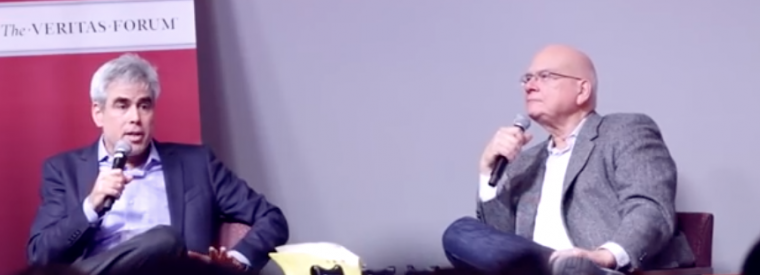A conservative pastor, an atheist academic and why they could get along

What's the most pressing need in the world?
After the basic requirements for life that too many are denied – food, water, shelter – then surely the most urgent need is for us to learn how to live with difference.
In the United States, there is a chasm between voters on the coasts and those in the South and Mid West. In the UK the division is between those who voted Brexit and those who voted Remain.
But these aren't the only fault lines running through our societies.
Young people are in an increasingly parlous financial position while older people seem to be doing better, financially, than ever.
Race is still a festering faultline – especially in America – where the events of the past few summers and the development of the Black Lives Matter movement have drawn attention to injustices which remain generations after the end of slavery.
Let's move on to think about one of the biggest divisions in the world: religion.
Whether in America, Europe, The Middle East or beyond, faith is one of the biggest factors which divides societies internally and which keeps nations apart from each other.
The division of Nigeria into Christian and Muslim areas seems to have been deadly. The battle for supremacy in the Middle East between Sunni Saudi Arabia and Shia Iran is one of the main driving forces in massive conflicts such as that in Yemen.
The Israel-Palestine conflict has its roots in land disputes, but the religious elements cannot be ignored. Atheist China's persecution of Christians and other religious minorities is yet another example of a clash between faiths – or more accurately, the oppression of minority faiths by a majority faith.
This is a pressing concern for many reasons – not least that violent repression of one faith group by another is a major human rights issue. In addition – the world is not getting less religious as the confident assertions of sociologists assured us a few generations ago. Instead, in many parts of the world, not least China, religious faith is on the rise.
What then can be done?
Enter one of the most high profile pastors in the world and an atheist, Jewish academic.
Dr Tim Keller is the pastor of Redeemer Presbyterian Church in New York and the author of many books including The Reason For God. Professor Jonathan Haidt from New York University is also a best selling author, including such essential reading as The Righteous Mind.
Recently, the two men got together to discuss the issue of pluralism – whether it is possible for groups with different views and beliefs to live alongside each other in peace.
Keller's contention was that America was at a turning point. Having gone from an era where White Anglo-Saxon Protestant religion and morals were broadly the default and other groups were to an extent excluded, Keller said the risk is that now secular humanism is the default cultural paradigm, it will do the same to orthodox Christians.
Haidt himself shared some of these worries – at one point even admitting that he was worried about expressing his views too clearly, should he fall foul of social media caricatures of his views.
More than their arguments, though, the tone of the debate was the most impressive thing. Here are two academics from different worlds who don't agree on a number of areas. Yet their dialogue was respectful and engaging, to the point that there were frequent laughs for the audience.
They were proving that not only is pluralism desirable but also that it is possible. In a report for the British think tank Theos, David Barclay argued that rather than seeking to achieve agreement on every issue, the task facing different religious and secular groups was to form 'political friendships'. These would involve actually getting together and doing things, rather than sitting at arms length and arguing. It is in this spirit that Keller and Haidt recently debated and it is in this spirit that Christians should be seeking to engage the world.
Confident in our faith, our aim should be to reach out to Muslims, atheists and everyone else with the good news. But we must also be willing to listen, to act together for justice and always, always, to respect their differences from us. Thanks to Keller and Haidt for showing us the way forward. You can watch the whole discussion below.











